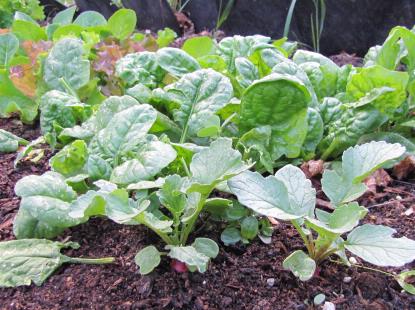Our former commander in chief enjoyed a well-worn phrase more than most. Sometimes he slipped up with his wording: “fool me once, shame on — shame on you. Fool me — you can’t get fooled again.” I’m thinking he didn’t mean to paraphrase The Who. When he wasn’t bumbling quotes, and sometimes when he was, his language was full of bluster. Take for instance his frequent declaration to root out evil. For me the phrase evokes gardening. More specifically, I think of pulling out Japanese knotweed and bindweed: if you don’t get all the roots, it will come back again. Just like evil.
I’m not sure whether evil is a plant, but it has put down some deep roots. Perhaps this is why the bad guys are so often labeled radicals. In this case we’re not talking about irrational numbers like the square root of negative one. We’re not referring to the basic Chinese root characters (radicals) or dangerous ions (free radicals). Instead, I mean those who want “fundamental” change. Change at the root. Oddly, the garden plant brought to mind by all this talk is anything but evil and certainly doesn’t radically change any meal.
The humble radish may not take a starring role in anybody’s food system, but I love it. The name, of course, comes from “radix.” That is the Latin root of radish is radix, meaning root. Sorry. Neither the boss nor the indigent boarders enjoy radishes. I’ll never understand why, as they’re so small one barely tastes the spicy bite. It just nips at the edge of a salad, making it that much more interesting. All the colors compliment the greenery and make a fresh salad all the more lovely.
Radish, spinach and lettuce are some of the first plants that I can harvest in the spring. In particular, given enough water, light and nutrients, radishes are ready to eat in just a few weeks. If I remember to plant a dozen seeds every weekend, I can have radishes every day all spring and summer.
That lovely spark in radishes is provided by allyl isothiocyanate, the same chemical that makes wasabi and horseradish so memorable. Allyl isothiocyanate actually directly activates channels in the cell membranes of your nasal cavities leading to pain, a pain that I have grown to love.
Plants of the brassicaceae family make alllyl isothiocyanate to discourage herbivory. Herb Ivory sounds like a failed lounge act, but in fact refers to animals eating plants. Some animals of course become immune to the noxious chemicals that plants make; witness the monarch butterfly’s immunity to the cardiac poisons in milkweed. Humans don’t develop immunity, instead we become accustomed to these poisons and enjoy their effects (think caffeine and morphine). As Bart Simpson says “radical dude.”
Our former commander in chief enjoyed a well-worn phrase more than most. Sometimes he slipped up with his wording: “fool me once, shame on — shame on you. Fool me — you can’t get fooled again.” I’m thinking he didn’t mean to paraphrase The Who. When he wasn’t bumbling quotes, and sometimes when he was, his language was full of bluster. Take for instance his frequent declaration to root out evil. For me the phrase evokes gardening. More specifically, I think of pulling out Japanese knotweed and bindweed: if you don’t get all the roots, it will come back again. Just like evil.
I’m not sure whether evil is a plant, but it has put down some deep roots. Perhaps this is why the bad guys are so often labeled radicals. In this case we’re not talking about irrational numbers like the square root of negative one. We’re not referring to the basic Chinese root characters (radicals) or dangerous ions (free radicals). Instead, I mean those who want “fundamental” change. Change at the root. Oddly, the garden plant brought to mind by all this talk is anything but evil and certainly doesn’t radically change any meal.
The humble radish may not take a starring role in anybody’s food system, but I love it. The name, of course, comes from “radix.” That is the Latin root of radish is radix, meaning root. Sorry. Neither the boss nor the indigent boarders enjoy radishes. I’ll never understand why, as they’re so small one barely tastes the spicy bite. It just nips at the edge of a salad, making it that much more interesting. All the colors compliment the greenery and make a fresh salad all the more lovely.

Radish, spinach and lettuce are some of the first plants that I can harvest in the spring. In particular, given enough water, light and nutrients, radishes are ready to eat in just a few weeks. If I remember to plant a dozen seeds every weekend, I can have radishes every day all spring and summer.
That lovely spark in radishes is provided by allyl isothiocyanate, the same chemical that makes wasabi and horseradish so memorable. Allyl isothiocyanate actually directly activates channels in the cell membranes of your nasal cavities leading to pain, a pain that I have grown to love.
Plants of the brassicaceae family make alllyl isothiocyanate to discourage herbivory. Herb Ivory sounds like a failed lounge act, but in fact refers to animals eating plants. Some animals of course become immune to the noxious chemicals that plants make; witness the monarch butterfly’s immunity to the cardiac poisons in milkweed. Humans don’t develop immunity, instead we become accustomed to these poisons and enjoy their effects (think caffeine and morphine). As Bart Simpson says “radical dude.”
Related



